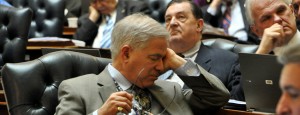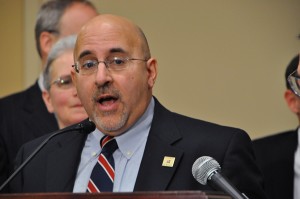Local
‘Strategic blunder of monstrous proportions’
Insiders rip HRC, Gill decision to cancel Maryland vote on marriage
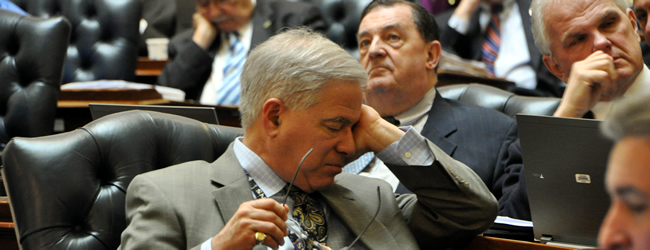
The decision to cancel a March 11 vote on a same-sex marriage bill in the Maryland House of Delegates was a mistake that could hurt rather than help the chances for passing the bill within the next several years, according to Maryland-based advocates who lobbied for the bill.
The advocates who expressed this view, some of whom spoke on condition that they not be identified, said at least four national LGBT groups put pressure on lawmakers through Equality Maryland, the statewide LGBT group, to withdraw the bill rather than risk a losing vote.
One of the advocates called the national groups and their political operatives who came to Maryland to lobby for the bill well intentioned but unfamiliar with the nuances and “rhythms” of the Maryland Legislature.
“I think this was a strategic blunder of monstrous proportions,” said Mark McLaurin, political director of Maryland’s Local 500 of the Service Employees International Union (SEIU), which lobbied for the bill.
McLaurin, a gay man who has lobbied the Maryland Legislature for progressive causes for more than 15 years, said many insiders familiar with the legislature don’t think a losing vote by a close margin would hurt the bill’s chances in the future.
On the other hand, McLaurin and others who favored taking a vote on the marriage bill said the legislature has a history of not taking up highly controversial bills two years in a row. McLaurin said he fears that the bill won’t come back for a vote until 2015, even though Speaker of the House Michael Busch (D-Anne Arundel County) said he would try to bring the measure back in 2012.
Busch said supporters appeared to fall just a few votes shy of the 71 votes needed to pass the bill in the 141-member House. However, he said wavering delegates might have chosen to vote “yes,” raising the possibility that the bill could have passed.
Several knowledgeable sources, who spoke on condition of anonymity, agreed with McLaurin’s assessment.
“Gill and HRC decided it was detrimental to the larger movement to have the vote go down,” one source said. “Gays and lesbians in Maryland deserved a debate and a vote on legislation that we waited years for.”
Another source criticized Busch’s handling of the bill.
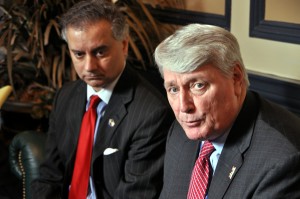
Maryland House of Delegates Majority Leader Kumar Barve and Maryland House Speaker Michael Busch (Washington Blade photo by Michael Key)
“[Speaker Michael] Busch could have squeezed harder but didn’t. This is a new House of Delegates and this man didn’t bother to take the temperature of the new House of Delegates. I was shocked. I thought House leadership was more strategic, intelligent and powerful than this and it all evaporated.
“God forbid we put our swing vote Democrats on the line to take a vote for our families. Or maybe the Speaker has lost control of his chamber.”
There was also criticism of Gov. Martin O’Malley, who the sources faulted for not taking a more public stand in support of the bill.
“O’Malley stopped by Friday for a photo op with marriage supporters,” one source said. “What a vacant gesture at the 11th hour. You couldn’t write an op-ed the week before?”
The Civil Marriage Protection Act won approval in the Maryland Senate earlier this month. It died last Friday for at least this year when the House of Delegates approved by voice vote a motion to send it back to committee.
All of the bill’s sponsors, including seven openly gay members of the House of Delegates, appeared to support the motion, a development that stunned LGBT activists watching the proceedings from the visitors’ gallery.
The motion to recommit the bill to committee came after supporters and opponents engaged in an emotional, two-and-a-half hour debate over the bill. Most of the activists for and against the bill watching from the galleries didn’t know that the bill’s sponsors had decided beforehand to cancel the vote.
McLaurin said he learned from those attending strategy meetings that the eight-member LGBT Caucus of the legislature was divided over whether to postpone the House vote.
The caucus includes Sen. Richard Madaleno (D-Montgomery County), and House of Delegates members Maggie McIntosh, Mary Washington, and Luke Clippinger, each Democrats from Baltimore; Heather Mizeur, Bonnie Cullison, and Anne Kaiser, each Democrats from Montgomery County; and Peter Murphy, a Democrat from Charles County.
Spokespersons for Equality Maryland, the statewide LGBT group that led the lobbying effort for the bill, and officials with the national groups Freedom to Marry and Human Rights Campaign defended the decision to withdraw the bill.
They said the decision was made jointly by the bill’s lead sponsors, including the one gay male and six lesbian delegates, who determined it was better to postpone the vote than to risk a losing vote, which they said would be perceived as a defeat.
“This is a strategic effort to give ourselves more time to make the case and win,” said Evan Wolfson, executive director of Freedom to Marry. “And all of us believe we can win. It’s just a matter of nailing down the votes and getting there.”
HRC spokesperson Fred Sainz said the decision to cancel the vote came after it became clear that supporters didn’t have the votes to pass it.
“This was a shared decision by all the stakeholders – Equality Maryland, the state’s LGBT Caucus, Gill Action, Freedom to Marry, and HRC,” he said. “It was the consensus belief that the best way to win marriage in Maryland was by a delay and not by losing a vote.”
Officials with Gill Action, a philanthropic group founded by gay businessman Tim Gill in Colorado that funds LGBT rights causes, did not return a call seeking comment.
An official with the Gay & Lesbian Victory Fund, Robin Brand, also pushed for postponing the vote, activists familiar with the legislature said. Brand told the Blade she discussed the issue with the gay delegates in the Victory Fund’s role of working with openly gay elected officials. She said she left it up to them to decide on whether or not a vote should be taken.
McLaurin, a former member of the Equality Maryland board, said the advocates who wanted the vote to go forward believe it would have been worth “a roll of the dice” to determine if supporters had the 71 votes needed to pass the bill.
“In the worst case scenario we would have come up two or three votes short,” he said. “And I think that a loss by two or three votes would be much more galvanizing to the community of supporters that we’re going to need to rally and accomplish this goal.”
McLaurin added, “Either way it was going to get billed as a failure. I’d rather have on record who’s with us and who’s against us.”
Another former Equality Maryland board member, David Toth, wrote in a Facebook posting that the group was deleting messages left on its own Facebook page that were posted by a large number of supporters who expressed outrage over the decision not to have a vote on the bill.
“Anyone who is asking questions of EqMD or its staff is having their posts deleted like crazy,” he wrote. “After donating thousands of dollars and working on the board for over six years I simply find this appalling.”
Wolfson of Freedom to Marry cautioned that a public fight over the decision not to have a vote could hurt efforts to bring the bill back next year.
“This is a temporary pause in the voting and it’s not a pause in the work,” he said. “So we don’t need finger pointing and recriminations, we need redoubling the effort to win.”
Although Equality Maryland, led by executive director, Morgan Meneses-Sheets, was billed as the lead organization calling the shots, insiders say field workers from the national groups like Freedom to Marry, HRC and Gill Action Fund far outnumbered Equality Maryland’s staffers working the halls of the legislature in Annapolis.
It was the national groups, rather than Equality Maryland, that had the ear of supportive lawmakers, including the LGBT Caucus members, during the days leading up to the scheduled vote on the bill in the House, McLaurin and other insiders said.
In a March 10 e-mail sent to LGBT Caucus members and other lawmakers supporting the bill, representatives of Freedom to Marry, Gill Action and HRC urged the lawmakers to postpone the vote.
“With the rights of so many Marylanders on the line, we wanted to flag our serious concern about going to a floor vote tomorrow when it’s not been confirmed we have 71 votes,” the e-mail says. “Various counts have us at 69 or 70 but not 71 or beyond.”
The e-mail adds, “The decision on whether to ask the leadership to move forward or postpone the vote rests with our openly LGBT legislators and other sponsors (in consultation with EQMD) who know their colleagues far better than we do, and who have so courageously led the way.”
The e-mail was signed by Bill Smith and Sarah Vaughn, national political director and deputy political director of Gill Action; Marty Rouse and Sultan Shakir, the lead officials at HRC’s field office; and Marc Solomon, national campaign director for Freedom to Marry.
In a separate e-mail sent the next day to most of the same people, HRC’s Rouse warned of serious political consequences if a vote on the marriage bill were to be taken.
“I plead with you to please delay this vote,” he said. “It would be devastating to suffer a huge loss. There will be vitriol and pain that may take years to soothe.”
Rouse said he also feared that a losing vote would damage relationships between the LGBT community and lawmakers who voted against the bill.
“I am sure that relationships are already frayed, but, if there are impassioned speeches on the floor, and tears shed, and we still lose, those relationships will be damaged even more. The air in the chamber will be toxic for months if not years,” he said.
McLaurin said at least some of the strained relations that Rouse mentioned have already come about, in part, because of the impassioned debate on the House floor that took place on March 11. He said he was puzzled over why those making the decision chose to have the debate and not go one step further to allow a vote to take place.
According to McLaurin, Speaker Busch left it up to the bill’s supporters and Equality Maryland to make the final call on whether to have a vote.
“From what I’ve been told by people in the know, he said, ‘What’s your pleasure? I’ll defer to you.’”
“And so from my understanding, there was a lot of pressure from the national organizations not to pull the trigger on a vote unless you are certain you had 71 votes because apparently it would demoralize our [same-sex marriage] efforts in Rhode Island and New York,” said McLaurin.
“I say poppycock. Pulling the bill from the floor is a defeat every bit as much as a losing vote is,” he said.
McLaurin said he thinks some of the national LGBT officials pushing for a delay in the Maryland vote had a fundamental misunderstanding that the Maryland House of Delegates would act like the New York State Senate acted in 2008, when it defeated a same-same marriage bill by a 38-24 vote.
Most supporters of the New York bill thought the vote would be much closer. Gay State Sen. Tom Duane (D-Manhattan) said he believed he had lined up enough votes to pass the measure. But when a roll-call vote started, a few wavering senators voted no, causing what observers called a cascading or “avalanche” effect, prompting others whose support was shaky to vote no.
McLaurin said such a development could not happen in the Maryland House of Delegates because all votes are cast electronically at the same time. No one knows who votes which way until the final tally is released seconds after the votes are cast. Pages on the floor then distribute a printout showing how the delegates voted.
“That’s why one of my underlying themes is you’ve got to know the Maryland Legislature,” he said. “We can’t have national groups fly in from L.A. and New York and train in from D.C. and conduct this campaign because we’re fundamentally different. We’re a different body.”
If some of the national group representatives had been in Annapolis at the time the legislature debated a highly contentious bill to repeal the state’s death penalty in 2007 or during several abortion related debates in the 1990s they would have seen a great reluctance to revisit these issues a second time, McLaurin said.
“What I fear is next year there’s just not going to be the stomach to do this again,” he said in discussing the marriage bill. “If you listened to the debate on the floor, everyone spoke of how deeply divided the House was, how deeply emotional this was, how it frayed relationships, how people weren’t speaking to each other.
“Do you think they will have the stomach to do that again next year without any reasonable expectation of a different outcome because they’re still pitching the same ideas to the same audience?”
“No one would be happier to be wrong about this than me,” he said. “But I just don’t think that I am. And I know I’m not alone. Some of the chief strategists behind this bill feel the same way I do.”
Wolfson of Freedom to Marry disputes that assessment.
“Anyone who is making comments to you or to anyone else suggesting that somehow this is over and it’s now a cause for finger pointing has failed to understand that it’s not over,” he said. “We’re in the midst of the work and we all should keep our eye on the prize of doing what we can to round up the last few votes and win.”
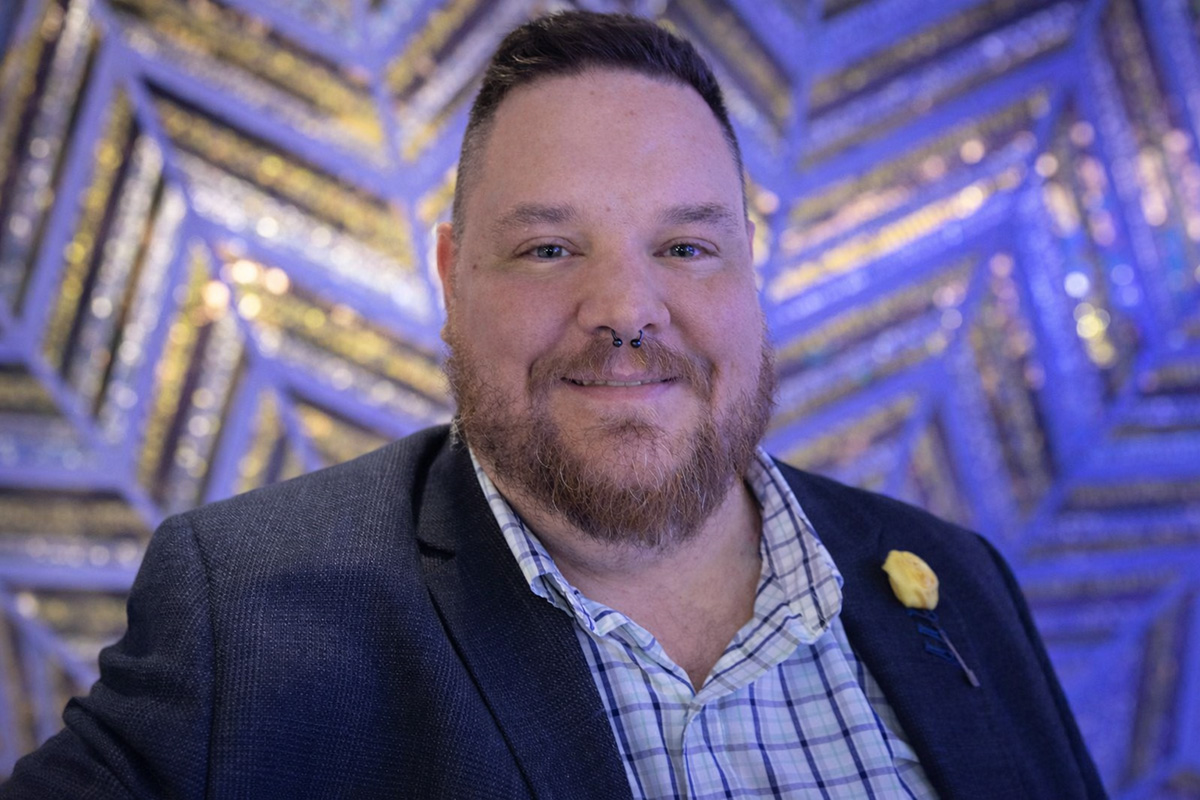
The Comings & Goings column is about sharing the professional successes of our community. We want to recognize those landing new jobs, new clients for their business, joining boards of organizations and other achievements. Please share your successes with us at [email protected].
The Comings & Goings column also invites LGBTQ+ college students to share their successes with us. If you have been elected to a student government position, gotten an exciting internship, or are graduating and beginning your career with a great job, let us know so we can share your success.
Congratulations to R. Warren Gill III, M.Div., M.A. on being appointed as the development manager at HIPS. Upon his appointment, Gill said, “For as long as I’ve lived in Washington, D.C., I’ve followed and admired the life-saving work HIPS does in our communities. I’m proud to join the staff and help strengthen the financial support that sustains this work.”
Gill will lead fundraising strategy, donor engagement, and institutional partnerships. HIPS promotes the health, rights, and dignity of individuals and communities impacted by sexual exchange and/or drug use due to choice, coercion, or circumstance. HIPS provides compassionate harm reduction services, advocacy, and community engagement that is respectful, non-judgmental, and affirms and honors individual power and agency.
Gill has built a career at the intersection of progressive politics, advocacy, and nonprofit leadership. Previously he served as director of communications at AIDS United, supporting national efforts to end the HIV epidemic. Prior to that he had roles including; being press secretary for Sen. Bernie Sanders during the 2016 presidential primary, and working with the General Board of Church and Society, the United Methodist Church, the denomination’s social justice and advocacy arm.
Gill earned his bachelor’s degree in philosophy and religious studies, Jewish Studies, Stockton University; his master’s degree in political communication from American University, where his graduate research focused on values-based messaging and cognitive linguistics; and his master of Divinity degree from the Pacific School of Religion.
District of Columbia
Judge denies D.C. request to dismiss gay police captain’s anti-bias lawsuit
MPD accused of illegally demoting officer for taking family leave to care for newborn child
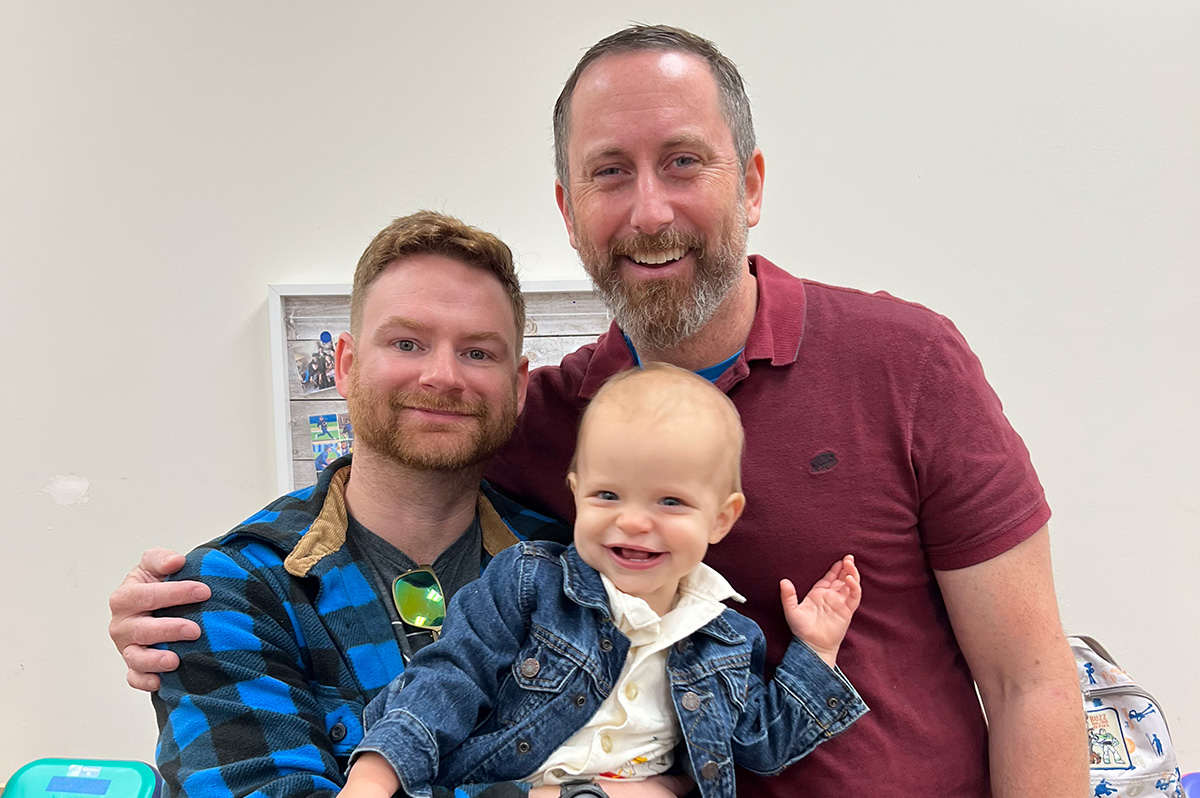
A U.S. District Court judge on Jan. 21 denied a request by attorneys representing the D.C. Metropolitan Police Department to dismiss a lawsuit filed by a gay captain accusing police officials of illegally demoting him for taking parental leave to join his husband in caring for their newborn son.
The lawsuit filed by Capt. Paul Hrebenak charges that police officials violated the U.S. Family and Medical Leave Act, a similar D.C. family leave law, and the Constitution’s Equal Protection Clause by refusing to allow him to return to his position as director of the department’s School Safety Division upon his return from parental leave.
It says police officials transferred Hrebenak to another police division against his wishes, which was a far less desirable job and was the equivalent of a demotion, even though it had the same pay grade as his earlier job.
In response to a motion filed by attorneys with the Office of the D.C. Attorney General, which represents and defends D.C. government agencies against lawsuits, Judge Randolph D. Moss agreed to dismiss seven of the lawsuit’s 14 counts or claims but left in place six counts.
Scott Lempert, the attorney representing Hrebenak, said he and Hrebenak agreed to drop one of the 14 counts prior to the Jan. 21 court hearing.
“He did not dismiss the essential claims in this case,” Lempert told the Washington Blade. “So, we won is the short answer. We defeated the motion to dismiss the case.”
Gabriel Shoglow, a spokesperson for the Office of the D.C. Attorney General, said the office has a policy of not commenting on pending litigation and it would not comment on the judge’s ruling upholding six of the lawsuit’s initial 14 counts.
In issuing his ruling from the bench, Moss gave Lempert the option of filing an amended complaint by March 6 to seek the reinstatement of the counts he dismissed. He gave attorneys for the D.C. attorney general’s office a deadline of March 20 to file a response to an amended complaint.
Lempert told the Blade he and Hrebenak have yet to decide whether to file an amended complaint or whether to ask the judge to move the case ahead to a jury trial, which they initially requested.
In its 26-page motion calling for dismissal of the case, filed on May 30, 2025, D.C. Office of the Attorney General attorneys argue that the police department has legal authority to transfer its officers, including captains, to a different job. It says that Hrebenak’s transfer to a position of watch commander at the department’s First District was fully equivalent in status to his job as director of the School Safety Division.
“The Watch Commander position is not alleged to have changed plaintiff’s rank of captain or his benefits or pay, and thus plaintiff has not plausibly alleged that he was put in a non-equivalent position,” the motion to dismiss states.
“Thus, his reassignment is not a demotion,” it says. “And the fact that his shift changed does not mean that the position is not equivalent to his prior position. The law does not require that every single aspect of the positions be the same.”
Hrebenak’s lawsuit states that “straight” police officers have routinely taken similar family and parental leave to care for a newborn child and have not been transferred to a different job. According to the lawsuit, the School Safety Division assignment allowed him to work a day shift, a needed shift for his recognized disability of Crohn’s Disease, which the lawsuit says is exacerbated by working late hours at night.
The lawsuit points out that Hrebenak disclosed he had Crohn’s Disease at the time he applied for his police job, and it was determined he could carry out his duties as an officer despite this ailment, which was listed as a disability.
Among other things, the lawsuit notes that Hrebenak had a designated reserved parking space for his earlier job and lost the parking space for the job to which he was transferred.
“Plaintiff’s removal as director at MPD’s School Safety Division was a targeted, premeditated punishment for his taking statutorily protected leave as a gay man,” the lawsuit states. “There was no operational need by MPD to remove plaintiff as director of MPD’s School Safety Division, a position in which plaintiff very successfully served for years,” it says.
In another action to strengthen Hrebenak’s opposition to the city’s motion to dismiss the case, Lempert filed with the court on Jan. 15 a “Notice of Supplemental Authority” that included two controversial reports that Lempert said showed that former D.C. Police Chief Pamela Smith put in place a policy of involuntary police transfers “to effectively demote and end careers of personnel who had displeased Chief Smith and or others in MPD leadership.”
One of the reports was prepared by the Republican members of the House Oversight and Government Reform Committee and the other was prepared by the office of Jeanine Pirro, the U.S. attorney for D.C. appointed by President Donald Trump.
Both reports allege that Smith, who resigned from her position as chief effective Dec. 31, pressured police officials to change crime reporting data to make it appear that the number of violent crimes was significantly lower than it actually was by threatening to transfer them to undesirable positions in the department. Smith has denied those claims.
“These findings support plaintiff’s arguments that it was the policy or custom of MPD to inflect involuntary transfers on MPD personnel as retaliation for doing or saying something in which leadership disapproved,” Lempert says in his court filing submitting the two reports.
“As shown, many officers suffered under this pervasive custom, including Capt. Hrebenak,” he stated. “Accordingly, by definition, transferred positions were not equivalent to officers’ previous positions,” he added.
Virginia
LGBTQ rights at forefront of 2026 legislative session in Va.
Repeal of state’s marriage amendment a top priority

With 2026 ramping up, LGBTQ rights are at the forefront of Virginia politics.
The repeal of Virginia’s constitutional amendment that defines marriage as between a man and a woman is a top legislative priority for activists and advocacy groups.
The Virginia Senate on Jan. 17 by a 26-13 vote margin approved outgoing state Sen. Adam Ebbin (D-Alexandria)’s resolution that would repeal the Marshall-Newman Amendment. The Virginia House of Delegates earlier this month passed it.
Two successive legislatures must approve the resolution before it can go to the ballot.
The resolution passed in 2025. Voters are expected to consider repealing the amendment on Nov. 3.
The Virginia General Assembly opened with an introduction of a two-year budget — Virginia’s budget runs biannually.
In 2024 some funding was allocated to LGBTQ causes, and others were passed over. This year’s proposed budget leaves room for funding for a host of LGBTQ opportunities. One specific priority that Equality Virginia is promoting would ensure the state budget expands healthcare for LGBTQ individuals and extending gender affirming care.
Equality Virginia Communications Director Reed Williams told the Washington Blade the organization is also focused on passing three main budget amendments, and ensuring “LGBTQ+ students and their teachers have resources to navigate and address mental health challenges in K-12 schools.”
Along with ensuring school training, the organization wants funding in hopes of “establishing enhanced competency training for Virginia’s 988 Lifeline counselors and support staff to provide affirming care for LGBTQ+ youth.” This comes after the Trump-Vance administration shut down the specific hotline for LGBTQ young people that callers could previously reach if they called 988.
On a federal level, protections and health care access for LGBTQ people has taken a hit, as the Trump-Vance administration has continued to issue executive orders affecting the health care system. LGBTQ people no longer have federal legal health care protections, so local and state politics has become even more important for LGBTQ rights groups.
Equality Virginia has urged its supporters to call their local senators and stress the importance of voting to expand health care protections for LGBTQ people. The organization also plans to hold information sessions and a lobby day on Feb. 2.
Equality Virginia is tracking bills on its website.

